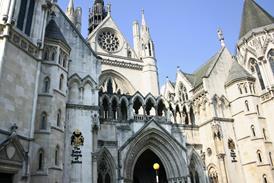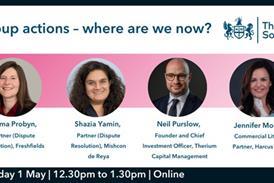Simon Davis, next President of the Law Society, considers the role of solicitors in upholding the rule of law.
The fabric of society is built around legal rights and obligations. Getting a job, buying a home, driving a car, getting married, getting divorced, running a business, employing, being employed, and often most life changing of all: being sued or threatened with prison – all depend on legal rights and obligations being validly created and effectively enforced. In short, civilised society depends on the rule of law being enforced, not the law of the jungle or the rule of the mob. And at the heart of upholding the rule of law is the solicitor.
Every year many hundreds of newly qualified solicitors attend admission ceremonies at Chancery Lane, conducted by the officeholders.
And a moving occasion it is. A fabulously diverse mix of age, race, colour, sex, religion, sexuality, background and physical ability come to the Law Society with their friends, families and partners, all bursting with pride.
And when it is my turn, I remind solicitors that their job is to help people stay out of trouble and that it is a great privilege to be the one who others entrust with resolving some of the most stressful moments they will ever experience.
It is not the job of the solicitor to give clients the advice they want to hear, but the advice that they need
And I remind them that with that great privilege comes a great responsibility. A client trusts that the solicitor is someone who is honest, who has integrity and who will give them impartial, clear and expert advice. Often the kind of advice they will not want to hear, and it is not the job of the solicitor to give clients the advice they want to hear, but the advice that they need. The solicitor is obliged to act in the best interests of the client, not their own. As officers of the court the solicitor is also obliged to put their responsibilities to the court ahead of their responsibilities to the client. One of the worst sins a solicitor can commit is to mislead the court or the opposition with a view to their client’s case prevailing.
When I talk to these solicitors and their families afterwards, it is obvious that they needed no reminding of these responsibilities. And even if they did, the Solicitors Regulation Authority (SRA) is there to remind them. Our parliament and regulators recognise that there is something so fundamentally important about the enforcement of the rule of law that our citizens require an added level of regulatory protection beyond that available to consumers generally. This is particularly applicable and important where civil and criminal court procedures are involved and personal liberty at stake. And it is the existence of the professional relationship of mutual trust and confidence between a solicitor and a client which further distinguishes that relationship from the arm’s length transactional arrangement between a seller and buyer in the marketplace.
I listen to the solicitors’ life stories. Some have University degrees, others qualify through the Chartered Legal Executives route, many worked part-time while studying at law school and all are looking forward to their careers ahead with a mixture of excitement and nervousness.
Overall, I am left feeling inspired and that the rule of law is in safe hands. Save for one dark and worrying shadow. Where are the criminal lawyers? Young solicitor after young solicitor tells me about their new roles in family, property, personal injury, wills, planning, litigation, mental health, commercial and corporate but where is crime? All too few. And is it any wonder.
The Secret Barrister should be compulsory reading for anyone in positions of influence
The Law Society, the Criminal Law Solicitors Association and Bar Council, to name just a few, have shouted alarm from the rooftops, in the press, in parliament, in court and on the streets at the devastation which has been done by governments of every hue to our criminal justice system. In the eyes of politicians it appears not to have the same appeal to voters as the NHS or the price of beer and petrol, but our system is in a crisis which is undermining fundamentally the rule of law and will deteriorate further as the deserts of criminal lawyers spread the land.
The recent publication The Secret Barrister should be compulsory reading for anyone in positions of influence. The solicitor is described as the ‘guiding light from dawn until dusk’, with their existence being described as critical to ensuring that our criminal justice system functions as it should. But the devastating cuts to legal aid mean that young solicitors on whom the future of the rule of law depends cannot make a living during those dawn to dusk hours.
The average age of a criminal duty solicitor across the whole of England and Wales is approaching 50. Taking just Worcestershire as an example, 63 per cent are over 50. And even when solicitors do choose to specialise in criminal law they find themselves in a system which is not just woefully under resourced but often regarded by the media as getting in the way of the ‘right result’ that the public desires. No wonder so many move into less stressful and better paid areas of the law.
All is not lost. Despite the challenges, there are still many young solicitors and barristers keeping the rule of law afloat and propping up our system of justice. We are lucky to have them.
But unless you are content that one day the newly qualified solicitor heading into the criminal justice system is already an object of curiosity; that our courtrooms are thronged with litigants in person; and that you or your loved ones are sitting in a cell with no-one to call, waiting for the judgment of politicians or the press to be handed down, get round to your MP and call for action.
Simon Davis is the Vice President of the Law Society for England and Wales 2018 and a Partner at Clifford Chance.
This article first appeared in the November 2018 edition of the Practico Costs Briefing, a publication of Practico Ltd.
Join the Civil Litigation Section to access more articles, as well as support, advice and networking opportunities.

















